人教版高中英语必修一定语从句
人教版高中英语必修一unit4语法--定语从句强化训练题附答案

人教版必修一unit4语法:定语从句强化训练题一.课文原句感知1.But the one million people of the city,______thought little of these events,were asleep as usual thatnight.2.It was felt in Beijing,______is more than two hundred kilometers away.3.The number of people _____were killed or seriously injured reached more than 400,000.4.Then,laterthatafternoon,anotherbigquake______wasalmostasstrongasthefirstoneshookTangshan.5.The army organized teams to dig out those______were trapped and to bury the dead.6.Workers built shelters for survivors_________homes had been destroyed.二.用适当的关系代词填空(1)1.The building________wall is white is my uncle's house.2.I know the boy________you are looking for.3.Will you please lend me the very book________you bought yesterday?4.The student________the teacher praised at the class meeting is our monitor.5.The season________comes after spring is summer.6.This is the museum________we visited last Saturday.7.Is this the museum________you visited last Saturday?8.I found some photos of interesting places________were not far away from our city.9.The boy with________John spoke is my brother.10.The girl________leg was broken in the earthquake was taken to hospital.(2)1.We don’t know the number of people______lost their homes in the disaster.2.Those______want to go to the English party must be at the school gate by 7:30 pm.3.The first museum_______he visited in China was the History Museum.4.The film______you are looking forward to seeing will be on tomorrow.5.The building doors ________ are green is an office building.6.Do you know the man__________the little girl is turning to for help?7.All the competitors ______ should meet at the hall won the first three prizes.8.My grandpa always tells me things and persons_______he remembered when he was young.9.This is the very man_____gave me a hand last week.10.The club_____members are all music lovers has moved to a new place.(3)1.Anyone_______has helped to save the drowning girl is worth praising.2.He is the man_______lives next door.3.The house,________we bought last month,is very nice.4.I know the boy________you are looking for.5.The Great Wall is the last place________Mr Smith is going to visit before he leaves Beijing.6.I lived in a house__________windows faced north.7.Will you please pass me the book________cover is green?(4)1.Look at that lady ________ name is Pochi.2.He is a teacher ________ I like very much.3.Those pictures ________ were drawn by Tom are nice.4.Those ________ will go to the park stay here.5.That was all the money ________ I had.6.The house,________ we bought last month,is very nice.7.Look at the boy and his dog ________ are coming this way.8.I bought a vase yesterday,________ price is reasonable.三.单选题1.That evening,________ I will tell you more about later,I ended up working very late.A.that B.which C.what D.when2.By 16:30,________ was almost closing time,nearly all the paintings had been sold.A.which B.when C.what D.that3.When deeply absorbed in work,________ he often was,he would forget all about eating or sleeping.A.that B.which C.where D.when4.It is the third time that she has won the race,________ has surprised us all.A.that B.where C.which D.what5.The prize will go to the writer ________story shows the most imagination.A.that B.which C.whose D.what6.The old town has narrow streets and small houses ________are built close to each other.A.they B.where C.what D.that7.Mary was much kinder to Jack than she was to the others, ______of course, made all the others upset.A.who B.which C.what D.that8.Julie was good at German, French and Russian, all of ________she spoke fluently.A.who B.whom C.which D.that四.将下列句子合并成含有定语从句的复合句1.Do you know the bridge? It was built with stone._________________________________________________________________ __________2.The boy is my brother.He was here a minute ago._________________________________________________________________ _________3.The man is Mr Green.You saw him in the park._________________________________________________________________ ___________4.The woman looks like the singer.I’ve heard her songs on TV._________________________________________________________________ __________5.There is a little girl at the gate.She is crying for her mother._________________________________________________________________ __________五.翻译句子1.站在门口的那位男士是我的英语老师。
2019-2020学年新人教版高中英语新教案:必修一 定语从句与强调句和状语从句的区别 (1)

定语从句与其易混淆句型的辨析众所周知,定语从句是高中英语学习中的一个语法重点,老师、同学们都对此予以重点关注。
由此造成了这样一种现象:做题时,一遇到从句就往定语从句上想,尤其容易把一些形式上与定语从句相似的句型(主要是同位语从句、强调句、地点和时间状语从句)也当作定语从句来理解,结果产生错误。
因此,从某个方面来说,解答定语从句题的关键是弄清它和易混淆句型之间的区别。
一、定语从句与同位语从句定语从句和同位语从句都置于被修饰的名词或代词之后,形式上非常相似,尤其是由that引导时,最难区分。
实际上,两者的根本区别在于句法功能不同,与先行词的关系不同。
1. 句法功能不同定语从句相当于一个形容词,用来修饰、描述或限制其前面的名词、代词(称为先行词)或整个句子;同位语从句则相当于一个名词,是先行词所述内容的展开,即说明先行词的具体内容。
定语从句的引导词that在从句中一定充当句子成分;而同位语从句中的引导词that(被称为连接代词)在从句中只起连接作用,不充当任何句子成分。
定语从句的引导词在从句中作宾语或状语时,可以省略或被其他词代替;而同位语从句的引导词则一般不能省略,也不能被代替。
例1The news (that / which)we picked up from his informal conversation is true.我们从他的闲谈中听到的那个消息是真实的。
例2The news that Mr Li will teach us English next semester is true. 李先生下学期将教我们英语这个消息是真实的。
点评:例1的中that从句是定语从句,其作用相当于一个形容词,用来限定the news,that在从句中作宾语,可省略。
例2中的that从句是同位语从句,其作用相当于一个名词,本身就是the news的内容,that不能省略。
2. 与先行词关系不同定语从句所修饰、限定的先行词可以是名词或代词,当that省略时,定语从句本身是一个不完整的句子。
高中英语人教必修一Unit1-5定语从句整理

Unit 1-5定语从句整理Unit 1:1.Do you want a friend whom you could tell everything to (=to whom you could tell everything)?2.There was a time when a deep blue sky, the song of the birds, moonlight and flowers could never have kept me spellbound.3. It was the first time in a year and a half that (=when) I had seen the night face to face.4. I am only able to look at nature through dirty curtains hanging (=which hang)before very dusty windows.Unit 2:1. At first the English spoken(=which was spoken)in England was very different from the English spoken today.2. English became less like German because those who ruled (=ruling)England spoke first Danish and later French.3. Today the number of people learning (=who learn) English in China is increasing rapidly.4. Many people believe the English spoken (=which is spoken) on TV and the radio is standard English.5. Those who reported (=reporting) the news were expected to speak excellent English.6. However, on TV and the radio you will hear differences in the way(that/ in which) people speak.7. Some people who live (=living) in the mountains of the eastern USA speak with an older kind of English dialect.8. The USA is a large country in which (=where) many different dialects are spoken.Unit 3:1. They are Dai and grew up in western Yunnan Province near the Lancang River, the Chinese part of the river that is called (=called) the Mekong River in other countries.2. We found a large atlas with good maps that showed (=showing) details of world geography.3. It makes wide bends or meanders through low valleys to the plains where (=in which) rice grows.4. Along the way children dressed (=who were dressed) in long wool coats stopped to look at us.5. We will reach Dali in Yunnan Province soon, where (=in which) our cousins will join us.Unit 4:1. It was a night (that/ when/ at which)the earth didn’t sleep.2. But the one million people of the city, who thought little of these events, were asleep as usual that night.3. It was felt in Beijing, which (=and it) is more than two hundred kilometers away.4. A huge crack that (=which) was eight kilometres long and thirty metres wide cut across houses, roads and canals.5. The number of people who were killed or seriously injured reached more than 400,000.6. Later that afternoon, another big quake which (=that)was almost as strong as the first one shook Tangshan.7. The army organized teams to dig out those who were trapped and to bury the dead.8. Workers built shelters for survivors whose homes had been destroyed.9. Your speech was heard by a group of five judges, all of whom (=and all of them) agreed that it was the best one this year.10. Next month the city will open a new park to honour those who died in the terrible disaster.11. The park will also honour those who helped the survivors.12. As you know (=As is known), this is the day(that/when/on which) the quake happened eight years ago.Unit 5:1. The time when (=that) I first met Nelson Mandela was a very difficult period of my life.2. Mandela was the black lawyer to whom I went for advice (=whom I went to for advice).3. He was generous with his time, for which I was grateful (=which I was grateful for).4. The school where (=in which) I studied for only two years was three kilometres away.5. However, this was a time when one had got to have a passbook to live in Johannesburg.6. The day when (=that/ on which) Nelson Mandela helped me was one of my happiest.7. Until today we have reached a stage where (=in which) we have almost no rights at all.8. The parts of town in which (=where) they had to live were decided by white people.9. The places outside the towns where (=in which) they were sent to live were the poorest parts of South Africa.10. We were put into a position in which (=where) we had either to accept we were less important, or fight the government.11. We first broke the law in a way which (=that) was peaceful.12. It was a prison from which no one escaped (=which no one escaped from).13. Mr Mandela began a school for those of us who had little learning.14. He taught us during the lunch breaks and the evenings when (=that)we should have been asleep.15. We read books under our blankets and used anything (that) we could find to make candles to see the words.16. I felt bad the first time (that/ when) I talked to a group.17. I remembered the beatings and the cruelty of the guards and my friends who had died.。
2019新人教版高中英语必修一Unit4 语法 定语从句
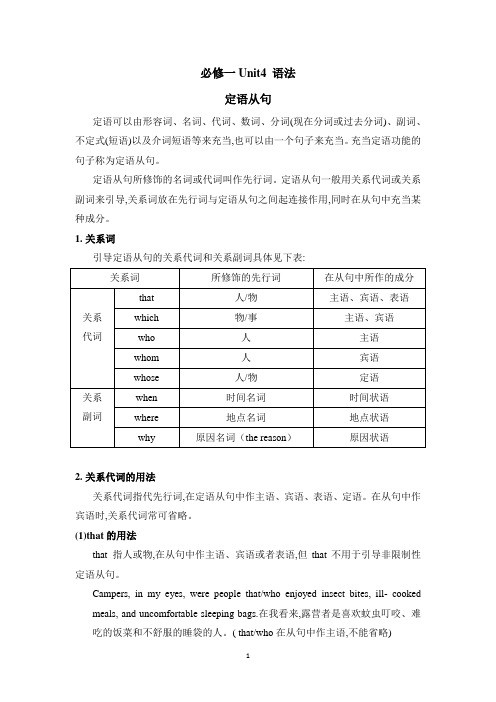
必修一Unit4 语法定语从句定语可以由形容词、名词、代词、数词、分词(现在分词或过去分词)、副词、不定式(短语)以及介词短语等来充当,也可以由一个句子来充当。
充当定语功能的句子称为定语从句。
定语从句所修饰的名词或代词叫作先行词。
定语从句一般用关系代词或关系副词来引导,关系词放在先行词与定语从句之间起连接作用,同时在从句中充当某种成分。
1.关系词引导定语从句的关系代词和关系副词具体见下表:2.关系代词的用法关系代词指代先行词,在定语从句中作主语、宾语、表语、定语。
在从句中作宾语时,关系代词常可省略。
(1)that的用法that 指人或物,在从句中作主语、宾语或者表语,但that不用于引导非限制性定语从句。
Campers, in my eyes, were people that/who enjoyed insect bites, ill- cooked meals, and uncomfortable sleeping bags.在我看来,露营者是喜欢蚊虫叮咬、难吃的饭菜和不舒服的睡袋的人。
( that/who在从句中作主语,不能省略)John is no longer the person ( that/who/whom) I knew five years ago.约翰不再是我五年前认识的那个约翰了。
(that/who/whom在从句中作宾语,可以省略) When the time came to make the final decision for a course , I decided to apply for the one that/which reflected my interest.到了最后决定修一门课程的时候,我决定申请那门能反映我兴趣的课程。
(that/which在从句中作主语,不能省略) The city is no longer the one ( that ) it used to be.这座城市不再是它原来的样子了。
人教版高中英语必修一Unit4 的语法(定语从句)说课课件(共24张PPT)
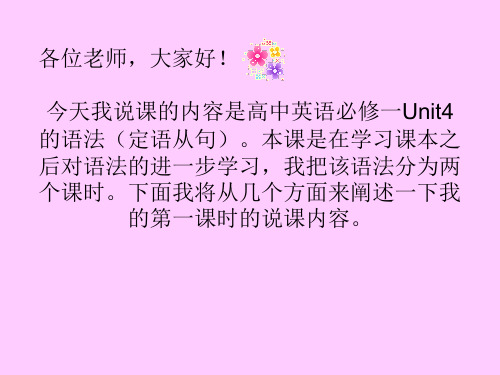
Part four:Homework.(具有承上启下的作用,有助于下节课学习)
1.Remember the table
2. show you a writing with attributive
clauses. (提前老师把复印好的writing范文发给学生下去)
3. finish your own writing with attributive
Which boy is my son?
My son
Jack
裤子是白色的男孩是我儿子。 The boy whose trousers are white is my son.
The boy the trousers of whom are white is my son.
关系代词的实质
Join the following sentences: A plane is a machine. The machine can fly.
groups.
只用that的情况
•当先行词是all, few,none, some,little, •everything, •anything, •nothing ,或 被every, any, all, some, no, little, few, much •等词修饰时
•当先行词被 序数词或形 容词最高级, 以及极端词
人,物
that
whose
物: which
关系代词:人或物,充当主,宾,定
指代 在从句 功能 中的作用
指代人
指代物
主语
who/that which/that
宾语
whom / which/that
who/that
定语
whose
高中英语新人教版必修一Unit 5定语从句精讲

高中英语必修一Unit 5定语从句精讲【课本例句】1.(教材P62)There are many reasons why this has been possible, but one of the mainfactors has been the Chinese writing system.2.(教材P62)Emperor Qinshihuang united the sevenmajor states into one unified country where Chinesewriting system began to develop in one direction.3.(教材P64)I told my mum that I wanted to give up,and that I would never live ina country whereGerman was spoken.4.(教材P64)I finally understood the reason why my mum had encouraged me not to give up.5.(教材P68)Then I saw an advertisement that offereda wonderful summer course, and that was the day whenI decided to take on a new language.6.Thetime when I first met Nelson Mandela was avery difficult period of my life.【发现规律】1.所有画线部分都是关系副词引导的定语从句。
2.关系副词when在定语从句中作时间状语(第5、6句)。
3.关系副词where在定语从句中作地点状语(第2、3句)。
4.关系副词why在定语从句中作原因状语(第1、4句)。
高中英语人教版必修一第一单元语法非限制性定语从句PPT

必修第一册第一单元重点语法
定语从句的定义:
定语从句是由关系代词或关系副词引导的从句,其作用是作定语修饰主 句的某个名词成分,相当于形容词。 定语从句又分为限制性定语从句和非限制性定语从句。
限制性定语从句就是对某个名词(先行词)起约束作用,使该词含义 更具体。
如girl, a girl who is beautiful. 对girl这个词限定起来,而不是随便什么 girl。
A: which B: where C: in which D: what
句式分析,此句不缺少东西, 如果去掉从句,句意完整。
be famous for...
3: Last summer we visited the West Lake, __ Hangzhou is famous in the world.
He said that he had never seen her before, _______ was not true.
In the presence of so many people he was little tense, ______ was understandable.
which在非限制性定语从句中可指代和修饰的是主句中的名词,形容词,短语,其 他从句或整个主句,在从句中作主语,动词宾语,介词宾语或表语。
3: The boy, whose father is an engineer, studies very hard.
总结: 1:非限制性定语从句起补充说明的作用, 在句子中不充当成分,缺少也不会影响全 句的理解,它与主句之间通常用逗号隔开。
1:who John,__w_h_o_ sells ancient vases,is an old friend of my father’s. His sister,__w_h_o__ works in an antique shop,is coming to see him tomorrow.
(人教版)高中英语必修一:unit 4 Earthquakes定语从句及语法讲解(I)

定语从句(1)概念引入:She is the girl who sings best of all.她是所有人中唱得最好的。
This is the best film that I have ever seen.这部电影是我看过的最好的一部。
He had failed in the maths exam, which made his father very angry.他数学考试没有及格,这使他的父亲很生气。
Give me the book whose cover is green.把那本儿绿皮儿的书给我。
定语从句是我们初中学过的一项语法,上面这些句子与你初中学的有差别吗?是不是有点不同呢?从这个单元开始,我们将学习定语从句的升级版,但还是从头开始学哟。
语法点拨【定语从句一P1】,定语从句的定义Do you know the girl who came here yesterday? 你认识昨天来的那个女孩吗?The book which he bought the day before yesterday is very good.他前天买的那本书很棒。
He is the man whom we should learn from. 他就是我们应该学习的人。
Her friend whose home is very far came to see her. 她的那位家很远的朋友来看她了。
其中粗体的部分就是定语从句,划横线的部分叫做先行词,也就是被定语从句修饰的词。
定语从句:修饰一个名词或代词的从句称为定语从句,一般紧跟在它所修饰的先行词后面。
先行词:被定语从句修饰的名词或代词。
关系词:上面例子中的关系代词who, whom, which, that是用来引导定语从句的连接词。
这些连接词代替先行词在从句中担任一个成分,如主语、宾语或表语。
例如:Those students who study in this school are good at football.(who代替先行词students在从句中充当主语)There is still much homework which we must finish.(which代替先行词homework在从句中充当宾语)关系代词引导的定语从句I. who和whom1. who和whom代表人, 当先行词在从句中作主语时用who引导,作宾语时用whom引导。
人教版高中英语必修一 Unit4_关系代词引导的定语从句 语法训练 含答案

语法训练—Unit4关系代词引导的定语从句一、用正确的关系代词完成单句语法填空。
1. The trees ________ stand by the river were planted by us.2。
She never gives in to those ________ have money。
3. This is the best film ________ has been shown so far in the city。
4。
February is the only month ________ has fewer than 30 days。
5. My son made notes of everything ________ he read。
6。
Yesterday I met the teacher ________ once taught us maths.7. Will you show me the girl ________ name is Wei Fang?8。
The tall girl ________ is standing there is a friend of my elder sister’s.9。
On the bus I saw a student ________ I believed was your brother。
10. Joseph is talking with the person ________ is standing by the taxi as if they were the closest friends in the world。
11. Do you like the present I bought you yesterday?12. The storybook was written by his uncle is quite interesting.13. The boy computer doesn’t work well needs your help。
高中英语新人教版必修一Unit 4语法知识定语从句精讲
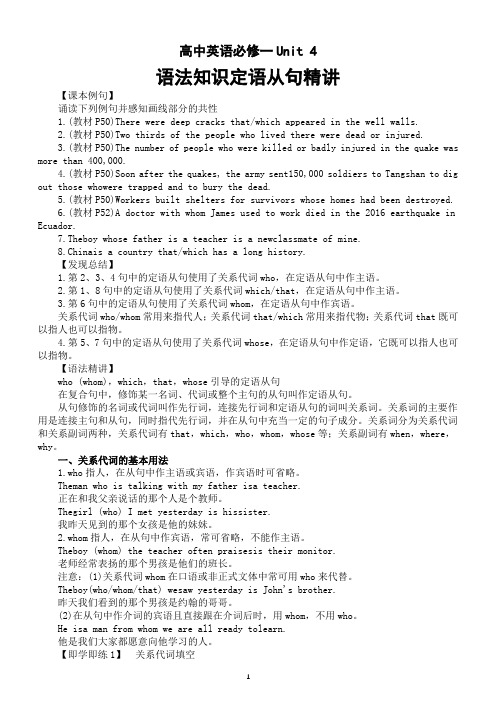
高中英语必修一Unit 4语法知识定语从句精讲【课本例句】诵读下列例句并感知画线部分的共性1.(教材P50)There were deep cracks that/which appeared in the well walls.2.(教材P50)Two thirds of the people who lived there were dead or injured.3.(教材P50)The number of people who were killed or badly injured in the quake was more than 400,000.4.(教材P50)Soon after the quakes, the army sent150,000 soldiers to Tangshan to dig out those whowere trapped and to bury the dead.5.(教材P50)Workers built shelters for survivors whose homes had been destroyed.6.(教材P52)A doctor with whom James used to work died in the 2016 earthquake in Ecuador.7.Theboy whose father is a teacher is a newclassmate of mine.8.Chinais a country that/which has a long history.【发现总结】1.第2、3、4句中的定语从句使用了关系代词who,在定语从句中作主语。
2.第1、8句中的定语从句使用了关系代词which/that,在定语从句中作主语。
3.第6句中的定语从句使用了关系代词whom,在定语从句中作宾语。
关系代词who/whom常用来指代人;关系代词that/which常用来指代物;关系代词that既可以指人也可以指物。
人教版高中英语必修一非限制性定语从句
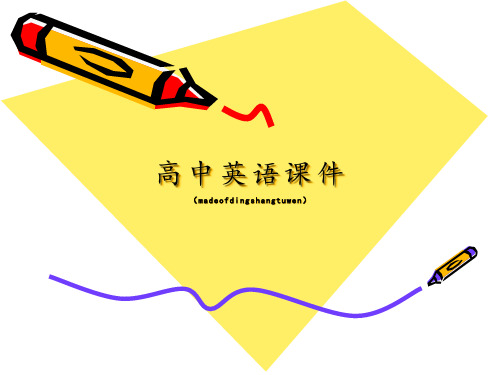
有时同一个限制性从句变为非限制性从句会改变全句的意思
1.Ihaveasisterwhoworksinahospital. 我有一位在医院工作的姐姐。(不只一位姐姐)
eg:youstillgotothegymeveryd ay,don’tyou?
• askforconfirmation
eg:youstillgotothegymeveryd ay,don’tyou?
Notice:
1.Weuseanegativequestiontagat theendofapositivestatement;w euseapositivequestiontagatthe endofanegativestatement.
非限制性定语从句中关系代词which/as可指整个主句 的意思或一部分意思。As引导的定语从句既可以位 于句末,也可以位于句首或句中。
Aseveryoneknows,Chinaisacountrywithalonghistory. 正如大家所知,中国是一个有着悠久历史的国家。
Sheisateacher,asisclearfromhermanner. 她是位教师,这一点从她的举止可以清楚地看出。
限制性定语从句与先行词之间不用逗号 隔开;
非限制性定语从句与先行词之间一般用 逗号隔开。
Mycousinwhosefatherisateacherwant stobeanactor.
Mycousin,whosefatherisateacher,wan tstobeanactor.
1.A.ThisistheplacewhereIlivedtenyearsago. B.SheisgoingtospendthewinterholidayinMacao,whic hreturnedtoChinain1999. 2.A.HeisamanwhoIcanaskforhelp. B.Hisfather,whoworksinBeijing,camebackyesterday
新人教版必修1高中英语Unit4EarthquakesSectionⅢGrammar_定语从句(Ⅰ)

3.(2018·全国卷Ⅱ语法填空)The Chinese Ministry of Agriculture finds that between 2005 — when the government started a soil-testing program that/which gives specific fertilizer recommendations to farmers — and 2011, fertilizer use dropped by 7.7 million tons.
在从句中充当成分。
二、关系代词的基本用法 1.that 既可指人也可指物,在定语从句中作主语、宾语或表语,
作宾语时常可省略。 The children that are injured in a car accident are being treated in the hospital now. 在车祸中受伤的孩子们现在正在医院接受治疗。 There is a film (that) I'd like to see. 有一部电影我想去看。
grammar. 4.Is oxygen the only gas that helps fire burn? 5.This is the biggest laboratory that/不填 we have ever built in
our school.
6.The Sound of Music is the first English film that/不填 I have ever seen.
一、定义
在主从复合句中,对某一名词或代词起修 定义
饰限制作用的从句
定
关系代词 who; whom; whose; which; that;
人教新课标高中英语必修一 unit4 语法定语从句
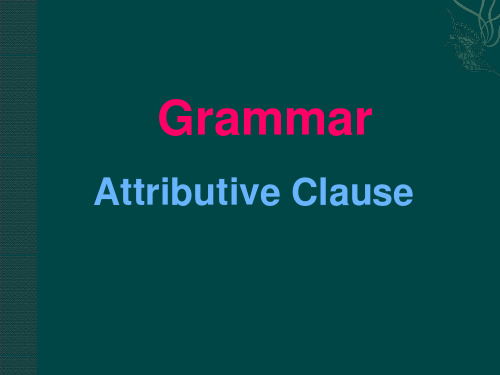
注: 从句中介词缺宾语时, 当先行词是人,介词后面只用 whom 当先行词是物,介词后面只用which
The teacher wants to return the book to the girl from whom he borrowed it.
Grammar
Attributive Clause
He is a little boy. He is eating.
He is a little boy who is eating.
He is a popular singer whose song is popular among young people.
Choose the best answers:
1. This is all ____ I know about the matter. A. that B. what C. who D. whether
2. Is there anything else _____ you want? A. which B. that C. who D. what
acrobat. (杂技演员) 4. He saw a house w__h_o_s_e windows were
all broken.
5. All the apples _t_h_a_t fall are eaten by wild boars.
6. Can you think of anyone _th__a_t could look after him?
Unit 1 语法非限定性定语从句(教学课件)——高中英语人教版(2019)选择性必修一

4.__A__s__ I explained on the phone, your request will
be considered at the next meeting.
5. Let’s read such books as will make them better. 6. He will give you such information as will help
Attributive Clauses
定语从句
学习目标
• 1、认识并区分限制性定语从句和非限制性 定语从句。
• 2、掌握 as 引导定语从句的用法。 • 3、掌握which 和 as 引导定语从句的区别
定义: 句所用修来饰修的饰名—名词—词或或代—代词—词叫的—先从行—句词(叫a定nt语ec从ed句en。t)被。定定语语从 从句一般是由—关—系—代—词或—关—系—副—词来引导的。 分类: 定语从句分为_限_制_性_定_语_从_句和 _非_限_制_性_定_语_从__句_。
the two countries are making progress.
2. Helen was much kinder to her youngest son than to
the others , w__h__i_c__h_ made the others envy him .
3. __A_s___ is often the case, we have worked out the
翻译为“_正__如__,__正__像_____”, 而which常译为 “_这__一__点__,__这__件__事_______” ③ 在限制性定语从句中,如果先行词被as, so , the same, such 修饰时,关系代词常用__a_s___。
人教版高中英语必修一 深度解读:定语从句中关系副词的用法
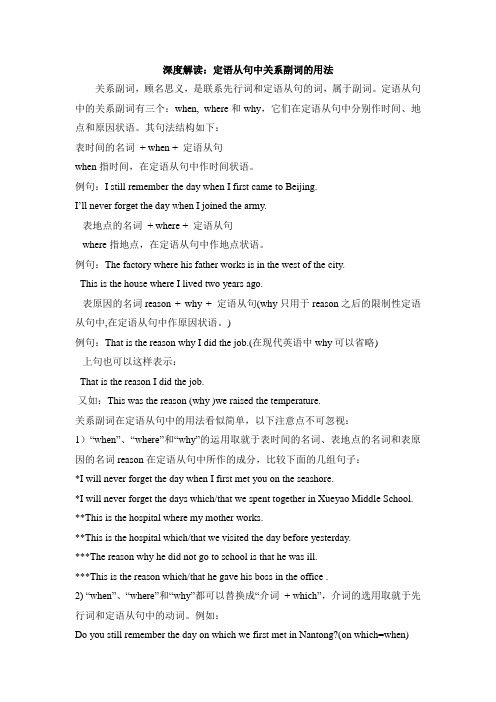
深度解读:定语从句中关系副词的用法关系副词,顾名思义,是联系先行词和定语从句的词,属于副词。
定语从句中的关系副词有三个:when, where和why,它们在定语从句中分别作时间、地点和原因状语。
其句法结构如下:表时间的名词+ when + 定语从句when指时间,在定语从句中作时间状语。
例句:I still remember the day when I first came to Beijing.I’ll never forget the day when I joined the arm y.表地点的名词+ where + 定语从句where指地点,在定语从句中作地点状语。
例句:The factory where his father works is in the west of the city.This is the house where I lived two years ago.表原因的名词reason + why + 定语从句(why只用于reason之后的限制性定语从句中,在定语从句中作原因状语。
)例句:That is the reason why I did the job.(在现代英语中why可以省略)上句也可以这样表示:That is the reason I did the job.又如:This was the reason (why )we raised the temperature.关系副词在定语从句中的用法看似简单,以下注意点不可忽视:1)“when”、“where”和“why”的运用取就于表时间的名词、表地点的名词和表原因的名词reason在定语从句中所作的成分,比较下面的几组句子:*I will never forget the day when I first met you on the seashore.*I will never forget the days which/that we spent together in Xueyao Middle School. **This is the hospital where my mother works.**This is the hospital which/that we visited the day before yesterday.***The reason why he did not go to school is that he was ill.***This is the reason which/that he gave his boss in the office .2) “when”、“where”和“why”都可以替换成“介词+ which”,介词的选用取就于先行词和定语从句中的动词。
人教版高中英语必修一Book1Unit4Grammar(定语从句(一))
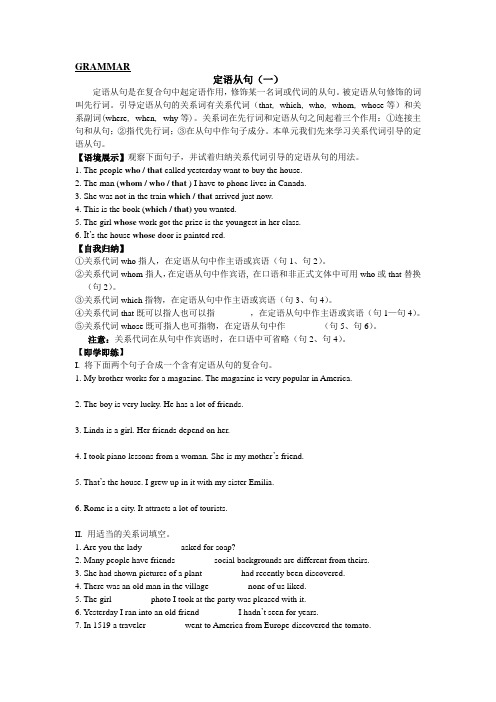
GRAMMAR定语从句(一)定语从句是在复合句中起定语作用,修饰某一名词或代词的从句。
被定语从句修饰的词叫先行词。
引导定语从句的关系词有关系代词(that, which, who, whom, whose等)和关系副词(where, when, why等)。
关系词在先行词和定语从句之间起着三个作用:①连接主句和从句;②指代先行词;③在从句中作句子成分。
本单元我们先来学习关系代词引导的定语从句。
【语境展示】观察下面句子,并试着归纳关系代词引导的定语从句的用法。
1. The people who / that called yesterday want to buy the house.2. The man (whom / who / that ) I have to phone lives in Canada.3. She was not in the train which / that arrived just now.4. This is the book (which / that) you wanted.5. The girl whose work got the prize is the youngest in her class.6. It’s the house whose door is painted red.【自我归纳】①关系代词who指人,在定语从句中作主语或宾语(句1、句2)。
②关系代词whom指人,在定语从句中作宾语, 在口语和非正式文体中可用who或that替换(句2)。
③关系代词which指物,在定语从句中作主语或宾语(句3、句4)。
④关系代词that既可以指人也可以指________,在定语从句中作主语或宾语(句1—句4)。
⑤关系代词whose既可指人也可指物,在定语从句中作________(句5、句6)。
注意:关系代词在从句中作宾语时,在口语中可省略(句2、句4)。
限制性定语从句(关系代词)的复习 课件 人教版高中英语必修一
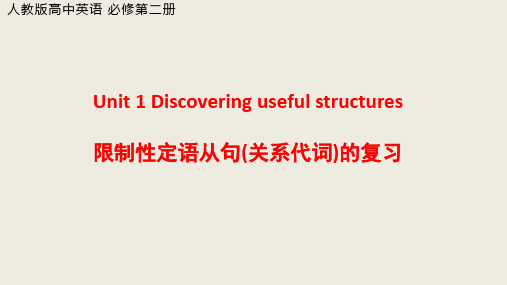
题,
in our community during the epidemic of COVID-19, and his main
写一篇短文参赛,内容包括: duty is to measure body temperature and check the passes for
3. A relationship with a true friend will surely produce fruit. You can count on a true friend. A relationship with a true friend _w_h__o_m_/_w_h_o_/_t_h_a_t_y_o_u_c_a_n__co_u_n_t__o_n__will surely produce fruit.
Step3 Summarize and share the rules
Step3 Summarize and share the rules
➢ A restrictive relative clause is used to modify a noun, pronoun or noun phrase before it.
4. You have been helped by others.To make friends, you should help others in the same way. To make friends, you should help others the way _i_n_w__h_ic_h_/_t_h_a_t _y_o_u_h_a_v_e__b_ee_n__h_e_lp_e_d__b_y_o_thers.
“The distance gets further and further if you are not meeting them. But it also show you the ones that don’t disappear because of the time and distance. They will be there for you if you need them.”
人教版高中英语必修1 定语从句介词+关系代词

D. all of whom
2. (2013•重庆卷) John invited about 40 people to his wedding, most of __D____are family members.
A. them B. that C. which D. whom
3. (2013•北京卷) Many countries are now setting
There are 40 students in our class, most of whom are from big cities.
I have many friends, the tallest of whom is Lee.
注意:
介词+关系代词
3.若先行词为时间名词, 地点名词或reason, “介 词+关系代词”可用相关的关系副词when, where, why替换
before, came to my office.
介词+关系代词: 练习
1. (2013•浙江卷) The children, ____D__ had played
the whole day long, were worn out.
A. all of what
B. all of which
C. all of them
e.g. Beijing is the city _i_n_w__h_ic_h__=_(_w_h_e_r_e_)_ he has lived
many years.
I remember the day _o_n_w__h_ic_h__=_(_w_h_e_n_)_ I go abroad.
The reason _f_o_r_w_h_i_c_h_=__(w__h_y_) _ he was late isn’t clear.
